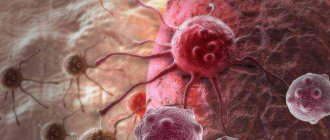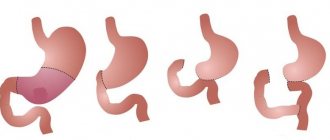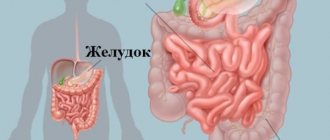Cancer sounds like a death sentence for every patient. The disease is dangerous, especially if it was detected at a late stage of development. The first question that arises for everyone without exception concerns survival from stomach cancer. Even an experienced doctor cannot answer it. Of course, there are statistics showing how long people with stomach cancer live, but all the data in it is averaged. Some people continue to live fully for more than seven years, while others already after a year notice signs of the last stage. What do these indicators depend on? To understand such a complex issue, let’s consider how the disease develops.
Life expectancy for stomach cancer depends on many factors
Causes
The development of gastric oncology can begin from any part of the stomach and affect neighboring organs, tissues, and also give metastases.
Many patients are interested in why pathology develops and what provokes it. Helicobacter pylori is recognized as the main factor causing gastrointestinal diseases. Because of this bacterium, in patients in whom it has been identified, the chance of developing cancer increases significantly. But besides this microorganism, there are several other reasons. These include the following:
Poor nutrition - eating large amounts of fatty, fried foods, with a lot of seasonings and salt negatively affects the gastric mucosa, which in the future can cause oncological pathologies. At the site of destruction of the mucous membrane by carcinogens, healthy cells mutate and degenerate into cancer.

Human nutrition should be balanced, rational and complete. Your daily diet should include a large amount of fresh vegetables and fruits rich in vitamin A, C and carotenoids. Food should include limited consumption of fried, fatty, salty foods. All this can help reduce the incidence of gastrointestinal cancer, as well as improve life prognosis. This diet should become a way of life. Refusal of proper nutrition leads to the occurrence of various diseases and deterioration of general health. In addition to diet, it is necessary to exclude the consumption of alcohol, tobacco and carbonated drinks.
Precancerous pathology is caused by diseases of the gastrointestinal tract, which are classified as precancerous pathologies, that is, they can subsequently degenerate into cancer. Such diseases include gastritis with reduced secrecy, polyps, gastric ulcers, and especially of the greater curvature.
Prevention
Prevention of stomach cancer comes down to minimizing risk factors that increase the likelihood of developing this disease:
- Normalization of nutrition.
- Timely treatment of stomach diseases: ulcers, gastritis, removal of polyps.
- To give up smoking.
- Timely completion of gastroscopy by patients at risk.
- Compliance with the physical activity regime.
| More information about the treatment of stomach cancer at the European Clinic: | |
| Treatment of stomach cancer | |
| Oncologist-gastroenterologist | 5100 rub. |
| Chemotherapy appointment | 6900 rub. |
| Emergency oncology care | from 11000 rub. |
| Radiologist consultation | 10500 rub. |
Book a consultation 24 hours a day
+7+7+78
Symptoms
The symptoms of the disease manifest themselves clearly. The patient experiences problems associated with the passage of food through the stomach, feels pain, significantly loses weight, feels weakness, and apathy.
Symptoms of stage three stomach cancer:
- The abdomen has increased in volume, indicating the presence of metastases.
- The skin has acquired a jaundiced tint.
- A severe cough with pain in the chest area indicates metastases in the lungs.
- There is blood in the stool.
- Nausea, vomiting, sometimes mixed with blood.
In cases where a stomach ulcer degenerates into oncology, the following symptoms appear:
- There have been changes in the pain syndrome - it has become more prolonged, aching, there is no connection with food intake, and it occurs at night.
- Anemia appeared.
- Unreasonable loss of body weight.
- Body temperature increases to 38 degrees, without cause, and then drops sharply and remains at 37.4 degrees for several days.
- The patient loses interest in his favorite foods, in particular meat and fish products.
If a stomach cancer tumor is formed as a result of a stomach ulcer, the initial signs of pathology are difficult to distinguish from the signs of a peptic ulcer. For this reason, patients often do not seek help from a doctor.
Important! In late-stage gastric cancer with metastases, the symptoms will be very different and depend on the location of the secondary lesions. Therefore, if a patient suffers from gastrointestinal pathologies, he needs to undergo a preventive examination.
Symptoms of stomach cancer
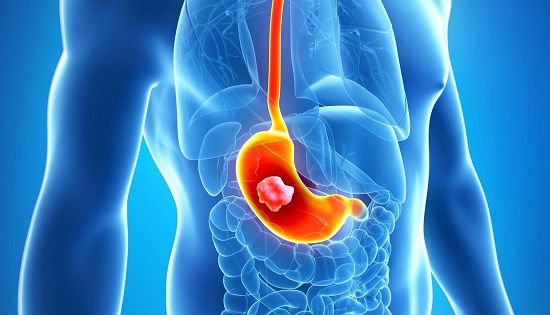
Like cancer of other organs, stomach cancer does not make itself known for a long time and does not show any special signs.
There are cases when a patient, based on symptoms, diagnoses himself not with cancer of the heart or gastrointestinal tract, but with cancer, for example:
- Symptoms similar to heart disease. The tumor is localized in the cardiac region of the stomach. The patient feels discomfort and aching pain in the sternum area. This occurs due to increased blood pressure (normal blood pressure is 120/80). Mainly occurs in elderly patients.
- Symptoms are similar to gastrointestinal diseases. A malignant neoplasm affects the intestinal part of the organ. Symptoms are similar to gastritis, ulcers, pancreatitis, cholecystitis. The diseases cause pain in the abdomen, nausea, which progresses to gag reflexes (blood can be seen in the vomit).
Due to an erroneous diagnosis, the underlying disease may remain hidden for a long time. After a full examination of an elderly patient, specialists diagnose diseases, but not oncology.
After treating diseases, the attending physician should be wary of:
- If after a course of therapy there is no effect.
- When studying the disease, diseases of the gastrointestinal tract are discovered.
Also, the doctor and the patient should be alert to signs that indicate small stomach cancer:
- The patient constantly has abdominal discomfort, that is, a feeling of fullness and heaviness in the stomach.
- It is difficult to swallow food, pain appears in the sternum, radiating to the back.
- after eating and taking medications, the pain does not subside;
- the patient quickly gets tired and feels weak even from little physical activity;
- rapidly losing weight (about 15 kilograms in six months, with an average weight of 75-85 kilograms), loss of appetite;
- there is an aversion to meat, although this was not the case before;
- after eating a small portion of a dish, the patient feels overeated.
Based on the results of a clinical study, a pattern of symptoms was established that identifies the symptoms of cancer:
- 55% of patients experience pain under the xiphoid process (anterior abdominal cavity).
- 40-50% of patients rapidly lose weight, and there are even cases of anorexia.
- Immediately after eating, the patient begins to feel sick, and in the future it can lead to vomiting, which occurs in 35% of cases.
- Blood stains are noticeable in the vomit - 20%.
- All mucous membranes begin to turn pale - 35%.
Symptoms may vary. This depends on where the tumor is located (upper, lower or middle part of the stomach).
If the tumor is localized in the upper region, the patient regularly experiences heart pain. While eating, problems with swallowing begin (in advanced cases, it is impossible to swallow).
The body becomes dehydrated, which over time leads to disseminated intravascular coagulation. An insufficient amount of protein leads to disruption of nitrogen-containing compounds (nitrogen metabolism) and, as a result, a critical level of under-oxidized blood substances.
If the tumor affects the middle part of the stomach, then gastric bleeding begins, which causes anemia. In the middle region of the stomach there are large vessels. The doctor conducts tests to detect bleeding.
If bleeding is present, the consistency and color of the stool changes significantly. The stool is liquid or mushy and black in color. acute pain means rapid growth of a tumor in the pancreas.
A tumor in the lower part causes dyspepsia, that is, the patient has regular diarrhea, constipation, vomiting, stomach pain, belching with a rotten smell.
The prognosis for stomach cancer depends on:
- degree of development of the neoplasm;
- structure of cancer cells;
- size of tumors;
- the patient's immune state.
Diagnostics
To identify the disease, the patient must undergo examination and receive a diagnosis. For this purpose, laboratory, instrumental and histological methods are used. Examination of the gastrointestinal tract using radiography can identify filling defects, changes in the relief of the mucous membrane, problems in peristalsis, changes in the size and shape of the stomach.
Fibrogastroduodenoscopy provides visualization of the tumor, the condition of the gastric mucosa, and allows identifying the source of bleeding. During this study, if necessary, biomaterial is taken for a biopsy.
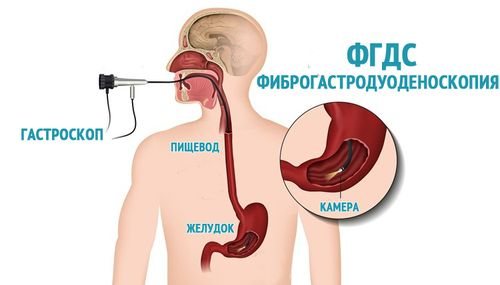
In cases of difficulty in making a diagnosis, laparotomy is prescribed. To determine how far the tumor has spread, and in order to detect the presence of metastases, an ultrasound examination of the abdominal organs, chest X-ray, CT, and MRI are performed.
Based on the results of the study, a forecast is made about the successful outcome of the operation and prolongation of the patient’s life.
Surgery for stage 3 stomach cancer and life expectancy after it
Malignant formations can form absolutely anywhere, but they especially often affect the digestive organs. The complexity of the pathology is that it is quite difficult to identify them in time. In most cases, doctors are contacted when there is stage 3 stomach cancer.
At earlier stages, it is difficult to determine the presence of abnormalities due to the clinical picture, which is no different from other gastrointestinal diseases. The first question that interests all patients with stage 3 stomach cancer is how long they live after surgery and whether it is worth doing it at all.
In order to answer it, it is necessary to understand the characteristics of the disease and consider methods of treating it.
The feasibility of surgery and life expectancy after it depend on the stage and characteristics of the development of stomach cancer
Causes of pathology
To date, the main cause that can cause the development of stomach cancer has not been found. Experts identify only provoking factors, which include smoking, eating spicy food, poor environment, excess salts, and so on. But still, not all people develop cancer and this is explained as follows.
All of the above is just a provoking factor. The reasons lie deeper. Hereditary predisposition is important. It is also important to note the accumulation of carcinogens in the human body.
All factors together significantly increase the risk of developing a tumor, and the more of them are present, the higher the likelihood of the disease.
The pathology develops unnoticed by the patient. This is precisely what explains the fact that the disease is often detected with metastases. Stage 3 stomach cancer may present with the following symptoms:
- pronounced weight loss;
- vomiting, especially often with blood;
- lack of normal and regular bowel movements.
Smoking is a provoking factor for the development of cancer.
All of the above symptoms may indicate a stomach ulcer, so you should not panic. A full examination should be carried out to determine the cause of the ailment.
Classification 3rd degree
For stage 3 stomach cancer, life expectancy depends on the type of pathology. In this regard, it is necessary to consider the classification of the disease. According to the stage of flow, the following are distinguished:
- 3A – the muscle layer and no more than 7 lymph nodes are involved;
- 3B – the outer layer of the organ and more than 8 lymph nodes are affected;
- 3C – the tumor grows outside the organ.
In addition, the formation is classified according to its cellular structure, growth rate, form of formation and the degree of distribution of malignant cells throughout the body.
At different stages of cancer, a certain number of lymph nodes are affected
According to statistics, for stage 3 stomach cancer, the survival prognosis is no more than 20%. At the same time, there are known cases of longer life after surgery.
How does stage 3 manifest?
As in any other case, the outcome of the pathology depends only on exactly when it was detected. That is why, before finding out what the life expectancy is for stage 3 stomach cancer, you should figure out how to identify this stage. It is usually manifested by the following clinic:
- exhaustion;
- blood in the stool;
- prostration;
- lack of appetite.
Weight loss with exhaustion is characteristic of stage 3 stomach cancer
As it progresses, symptoms such as increased abdominal volume, yellowness of the skin, cough, and pain in almost any location appear. Often, pathology develops at the site of an existing problem. This can be noticed by the appearance of new complaints. The pain is no longer associated with eating, it constantly increases in intensity, an aversion to food appears, and so on.
A change in the course of an existing disease, accompanied by the appearance of new symptoms, should be a reason to consult a doctor.
What to do if you have cancer
For stage three stomach cancer, the prognosis directly depends on how much surrounding tissue is affected at the time of contacting the doctors. As a rule, only 35% of patients reach the five-year mark. In this case, treatment is often symptomatic or supportive.
The fact is that at this stage of development the tumor already involves all layers of the stomach and spreads to a large number of lymph nodes. For this reason, it is simply impossible to remove it all. But still, intervention may be prescribed if the tumor is large and disrupts the function of neighboring organs.
In such a situation, only part of the formation is removed, which makes it possible to alleviate the patient’s condition.
Stage 3 cancer requires chemotherapy
Regardless of whether surgery was performed or not, chemotherapy is prescribed. It is thanks to properly selected drugs for stage 3 stomach cancer that the prognosis significantly improves. They are administered either by injection or in the form of tablets and capsules.
Under the influence of the active components, the destruction of malignant tumor cells occurs. This method is effective, but it has a lot of disadvantages and, first of all, these are side effects. These may include hair loss, weight loss, constant nausea, weakness, and so on.
But patients with this disease agree to any treatment method that offers a chance of alleviating the condition and prolonging life.
Today, the most commonly used drugs for damage to stomach tissue are Trastuzumab, Sunitinib, and Imatinib. Practice has shown that it is thanks to them that the survival prognosis for stage 3 stomach cancer significantly improves.
In addition to chemotherapy, radiation therapy may also be prescribed. It involves exposing the tumor to a beam of rays, which leads to tissue destruction. Due to this, it is possible to achieve a reduction in the size of the formation, which has a positive effect on the patient’s well-being. To increase efficiency, this technique can be combined with chemotherapy.
Radiation therapy is used to treat stage 3 cancer
Prevention and prognosis
It is theoretically impossible to prevent the development of cancer. This is explained by the fact that the reasons for the development of the pathology have not been found.
Therefore, all preventive measures come down to maintaining a balanced diet, giving up bad habits and timely treatment of chronic pathologies.
But, most importantly, these requirements must be met even if the diagnosis has already been made. The fact is that the speed of development of pathology depends on the general condition of the body, on the immune system and even on the psychological mood.
There is no need to panic or give up. You can’t sit and talk for days about why you developed stage 3 stomach cancer, how long you can live with this disease, and what lies ahead.
If you are severely depressed, you can even consult a psychotherapist. Perhaps he will prescribe medications to normalize the psycho-emotional state.
Only an optimistic attitude and accurate implementation of the doctor’s instructions will help achieve a good result.
Only a doctor can tell you about life expectancy and ways to prolong it in case of cancer in a specific case.
It is also important when the treatment began.
Often, patients, having learned about the presence of cancer, refuse therapy, being confident that the pathology will lead to death in any case and there is no point in wasting energy on chemotherapy, from which they still need to recover.
But it is important to emphasize here that cancer is often detected at a stage when there is only one localized tumor. If it is removed and several courses of chemotherapy are administered, stable remission can be achieved.
The presence of metastases can also affect prognosis in various ways. Therefore, when finding out how long people live with stage 3 gastric cancer with metastases, you need to take into account the number of foci, their location and size.
Of course, when the lungs or liver are affected, the prognosis is less favorable than, for example, when the intestines or lymph nodes are involved.
In conclusion, it should be added that there are cases when patients were treated with advanced forms and, nevertheless, the treatment given gave excellent results, prolonging the life of the patients by several years.
Cancer treatment will be discussed in the video:
Source: https://gipfelforyou.ru/zheludok/rak/skolko-zhivut-posle-operatsii-tretej-stadii-raka-zheludka.html
Treatment
Patients with this diagnosis often ask: how long should I live with stage 3 stomach cancer?
The life expectancy of such patients directly depends on the spread of metastases and the general condition of the patient.
In medical practice, there have been cases where, after resection of part of the stomach and adjacent organs affected by a tumor, it was possible to stop the growth of atypical cells for a long time. Patient survival depends on the treatment prescribed and the type of cancer.
Infiltrative cancer of the 3rd degree with metastases practically does not give the patient any chance, as does stomach cancer, complicated by breakthroughs and bleeding. Much depends on the rehabilitation period.
Surgical intervention at such a late stage is used not only to excise the tumor, but also to restore the passage of food if the formation has blocked the passage. During the operation, metastases in the lymph nodes and neighboring organs are also removed.
For stage three cancer, chemotherapy may be prescribed, either after surgery or instead of it, for an inoperable tumor.

Chemotherapy treatment can stop tumor growth temporarily, which means metastasis stops. Chemotherapy drugs are very harmful to the body, they cause side effects and suppress the immune system. But medicine does not stand still and specialists began to use drugs that act on malignant cells without harming healthy ones. But research on the effectiveness of these drugs has not yet been completed.
The use of radiation therapy is prescribed in conjunction with chemotherapy or as a stand-alone treatment. Modern equipment delivers radiation directly to the tumor itself, without affecting healthy tissue.
Treatment of gastric cancer stage 3
In case of third-stage stomach cancer, a life expectancy prognosis is often made - how long they live at the penultimate stage of oncology, the quality of subsequent life is determined. Survival and five-year life expectancy are determined depending on the location of metastasis. In some situations, successful partial removal of the stomach and nearby tissues and structures was carried out. This procedure is necessary to stop the growth and progression of the malignant process for a long time.
If metastasis has not spread to healthy neighboring organs and the tumor is eliminated, then the prognosis for five-year survival is relatively favorable. 50% of patients live more than five years after surgery. In real medical practice, surgery cannot stop the spread of metastases. Successful recovery depends on the selected therapeutic regimen and the typology of cancer.
The average five-year life expectancy for a tumor in the stomach with metastasis reaches 20-25% of diagnosed cases. It is impossible to specifically determine how long patients live after completing treatment for oncological pathology of the digestive organ. The prognosis is based on the influence of various factors on the body. The final result is influenced by the patient’s age category, the patient’s health status and the type of tumor growth.
An infiltrative cancer focus with metastasis at the third stage does not provide most affected people with a chance for a successful recovery. Patients die within six months of diagnosis. In case of oncology of the digestive organ with the presence of perforations and internal bleeding, the operation will provide the person with an additional 2-3 years of life. Treatment and outcomes mostly depend on the recovery period. Certain medical institutions guarantee a high probability of survival in advanced stages of gastric tumor development.
Stages of treatment:
- Operation. The only effective form of treatment is the total removal of all tissue affected by cancer - extended gastrectomy with resection of the greater and lesser omentum. If radical surgery cannot be performed, palliative resection of part of the stomach along with the tumor is used. Palliative operations (gastroenterostomy, gastrostomy) do not cure the disease or prolong life expectancy, but they alleviate the patient’s condition.
- Chemotherapy. The method is based on the use of chemotherapy - specially developed drugs that destroy tumor cells in the body. Unfortunately, with this approach, a large number of healthy cells also die, and side effects develop, such as temporary hair loss, exhaustion, and poor health. Drugs in this group are Methotrexate, Lomustine, Epirubicin, etc. In advanced forms of stomach cancer, chemotherapy is carried out over long courses.
- Radiation therapy. It involves irradiating areas of the body or organ structures affected by a malignant process. During the treatment, small doses of X-ray radiation are used, calculated individually for each patient. In case of cancer of the stomach, as a rule, targeted irradiation of the organ is used during surgery.
- Symptomatic therapy. The patient is prescribed supportive treatment, which includes the use of analgesics, drugs against nausea, vomiting and flatulence, immunomodulatory medications and normalizers of the intestinal microflora.
Forecast
The problem of low life expectancy is based on the fact that the diagnosis of pathology is carried out too late. For comparison:
- In Russia, out of 100 people diagnosed with stomach cancer at various stages, only 20 will overcome the five-year survival threshold.
- In Japan, the number of recovered people will be 80.
Doctors say that the surest way to improve the survival prognosis for a disease such as stomach cancer is to undergo a medical examination regularly, at least once a year. This is the only way to detect a stomach tumor at the earliest stage, when treatment will be quick and effective. Particular attention should be paid to preventive examination for people who are susceptible to cancer with a higher degree of probability, for example, smokers.
Loading…
Mechanism of cancer development
The pathology is characterized by a gradual course. It is often preceded by various stomach disorders. Over time, a malignant compaction forms, which tends to grow rapidly. At first, the tumor affects only the mucous membrane, which, if left untreated, begins to grow into all tissue structures. Thus, metastases actively occur. With stomach cancer, such tumors move to various organs through the circulatory and lymphatic systems. In this case, the liver is in a special risk group, since it is a kind of filter that cleanses the blood.
After formation, the tumor secretes special substances that provoke the growth of blood vessels around it. Thus, the blood flow to the tumor becomes more intense, and healthy tissues experience a nutritional deficiency. This process is called the symptom of stealing.
Therapy methods
The choice of treatment technique corresponds to the stage of the pathological process:
- At the initial stages of the development of a tumor neoplasm, operations aimed at removing the tumor followed by a course of chemotherapy can help.
- When diagnosing stage 2, surgical manipulations to partially remove the organ and lymph nodes using long-term chemotherapy are possible.
- With the development of the final stages of stomach cancer, the feasibility of performing operations disappears. Then the therapy is aimed at pain relief and removal of toxic components from the body.
To enlarge the picture, click on it.
Nutrition
The diet for this disease is determined by the possibility of eating. In difficult cases, a probe is installed through which special nutritional mixtures are introduced into the stomach or directly into the intestines.

If normal food intake is possible, a fractional diet is prescribed; meals should be nutritious with a high content of proteins and vegetable fats. Food is prepared pureed. All products that cause gastrointestinal irritation are excluded.



